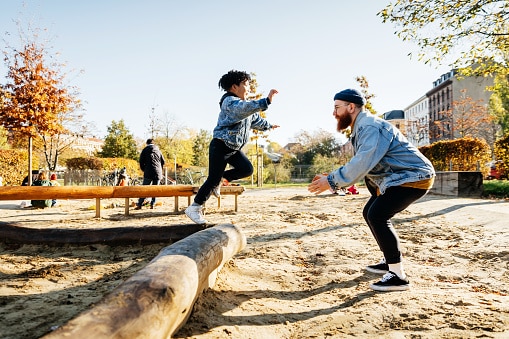You have value as an influencer in the life of children in Sunday school that still matters because you get to tell them the truth.
Editor’s Note: This article was transcribed from a webinar given by Beth Guckenberger to Sunday school leaders and teachers. Edits have been made for readability.
I grew up as a church kid my whole life. My heart has always loved Sunday school and vacation Bible school, youth group, and being old enough to be a volunteer in whatever age bracket was just below me. I have taught Sunday school, I have led youth groups, and I’ve functioned as interim senior pastors. And now most weekends I’m in a church sharing the kinds of things that we’re going to talk about here today. I am just a great lover of the ‘capital C’ Church.
And today, Sunday School still matters. I think it’s really important that we help children understand truth. My husband and I have grown our family in various ways. We have had biological children, we’ve adopted children, and we’ve participated in foster care.
There are all kinds of ways in which we’ve been involved in growing our family. And a number of years ago, we began the process to adopt an 11-year-old boy who was living in another country in a government orphanage. And I knew how important it was for us to just really quickly begin to facilitate attachment and connection with him.
I talked the social workers involved in the adoption to allow us to Skype with him as a family several times a week so that we could just start to build some rapport with him.
Imparting Truth
And about halfway through that 18-month process from when we decided to adopt him to when he was able to come home with us, he turned 12 years old. He got on one night on Skype and that night our normally upbeat kid was just not himself.
And I asked, “What’s going on, buddy?” And he said, “Oh, I got moved today from an 8-to-11-year-old dorm into a 12-to-18-year-old dorm.” I said, “That sounds hard.” He’s like, “I don’t even know anyone. And it’s really scary.”
And I could tell at the end he didn’t want to hang up. He felt really far away from me. And I said, “Listen, here’s what I do. When I have big feelings, I remind myself of the things I know are true. What do you know for sure is true?”
And he is like, “I don’t really know anything for sure is true.”

Sharing What’s True
And I said, “Okay, you can borrow what I know for sure is true here. Here’s what I know. You’re our son. We are coming for you. God has a plan. And we can trust it.” He was listening to me, so I said, “Why don’t you just repeat what I said?”
So, he said that back to me, “Yeah, I’m your son and you’re coming for me and God has a plan. I can trust it.”
And I’m not even sure that night he felt that much better, but I did. And that became the way we would sign off on our times together. He would just repeat that before he hung up. Eventually, 9 months after that, it was time to go to court. And we were there with all of our extended family ready to bring him back to our hometown of Cincinnati, Ohio.


Testimonies
And in his country, there’s a law that, because he is over the age of 12, he had to testify in his own voice in court that it was his desire to repatriate and be with our family. So, we walked into the courthouse and, all of a sudden, I could tell he was getting triggered from trauma.
He’d been very excited on the way to the courthouse. But I realized he’s been in this space before, and the last time he was in that space, a family fell apart. It didn’t come together. And nobody had helped him process those emotions. So, he was walking in with all these big feelings, but we had a court date to attend. So all of us started just doing the things that we already knew we had to do—social workers, attorneys, and his dad and I were testifying as part of the proceedings.
And at some point, the judge looked at him and said, “It’s your turn, buddy. Is this what you want? Would you like to go with this family and permanently relocate to their country?”
All he really had to do was say yes. But he just wasn’t there. He was what we would call dysregulated. He was highly triggered. So he wasn’t saying anything, and we were trying every trick and tool we knew to get him to say something.
Not knowing what else to do, I start to negotiate with the judge. And I’m like, “Hey, can you clear some people out? Can he be allowed to write it down? Can he go with you back into your chambers? Do we have a workaround?”
Then the judge said, “I’m sympathetic about what’s going on, but this is what I need from him in this setting.”
Waiting
And so, we sat there for what felt like a really long time. It was probably around five minutes. And I’m thinking, I wonder how long they’ll let me sit here. And then suddenly, our son Tyler lifted his head and he looked at the judge and he said, “I’m their son, and they came for me. God has a plan, and I’m going to trust it.”
I told him later that night that this is exactly why we put truth in our hearts—so that it’s ready for us, like right there at the ready for us when we most need it.
A couple of months later, he was getting ready to go into junior high in the United States. The night before school started, he was having all kinds of big feelings. And I said to him, “Hey, what do we do when we have big feelings?”
“Remember God has a plan, and you can trust it.”
The Good Gospel
And later that fall, it was time for me to unfold the basics of the gospel to him. And I’m like, you already know it. You know the truth. You know that God had a Son, and that Son came for you, and you know what that looks like. And He has a plan, and you can trust Him for it.
Today he’s 19 years old, and we still get big feelings in our house, right? About like the internet and girls and driving and pizza and soccer and school and Xbox. And there can be moments when one of us might be escalating. And there are plenty of times when I see him starting to get dysregulated that I remind him of the things that he knows are true.
You are my son and we came for you. And God has a plan. Just trust him.
And there are times when his mama gets all dysregulated, and he’s like, “Hey, don’t forget I’m your son. You came for me. God has a plan. You can trust it.“

Growing Roots
I think about what truth does, how it literally lands in our hearts and grows roots. And the way in which we then equip children for circumstances and feelings that they’re going to have when they’re not around us. They need to reach down and hold on to something that feels right and true and good.
These are the kinds of content that you teach in that safe and trusted environment of your church. The stakes are really high for kids. And the importance of what you teach them walks with them forever.
I had the same Sunday school teacher for 4 years in a row in my little Presbyterian church when I was growing up. And I hadn’t seen her for a long time because I spent a couple of decades out of the country. Recently I was at a speaking engagement, and she was in the crowd.
When I saw her, I said, “Do you understand that you are a critical part of the foundation of my life? That some of the truths that I talk about now to other people, I learned in your classroom? That every time I go out and share the gospel, it’s fruit born off of your tree?”
And when I think about trees, I think the first thing I wanted to talk about was this:
Tamarisk Tree
I travel a lot to Israel. I think biblical horticulture is kind of interesting.
That might not be your area of interest, but there’s a particular tree that I learned about in Israel. It’s called a tamarisk tree. And a tamarisk tree is most interesting because it takes at least 20—sometimes 40—years for it to come to maturation and bear fruit. So nobody is actually going to plant a tamarisk tree for their own benefit.
Everybody plants the tamarisk tree for the benefit of the next generation, which is why there’s a rabbinic saying that you should plant a tamarisk tree every day. This is a way to say you should do something on a regular basis that’s for the benefit of the generation that’s coming behind you.
But the place we find this in Scripture is in Genesis Chapter 21 and the story of Abraham. Abraham plants a tamarisk tree in Beersheba. And what makes that so fascinating is this is the guy who got two promises. You’re going to have as many descendants as stars in the sky and this is the land in which they’re going to dwell.
That’s for the benefit of the generation that’s coming behind you.
By planting this tree, it was actually an act of faith. He was trusting and believing that God would fulfill His promise and that there would somehow be as many descendants as stars in the sky. There’d be someone in 20 or 40 years who would benefit from the tree that he was planting today. It was his way of declaring to the Lord, I trust you. And then where it is that he’d planted it was right there on the edge of the promise land.
He was saying, I believe that you’re going to give this land to me and to mine.
The Stats
You all know these statistics, right? There are 2 billion children on the planet today. 50% of them—or 1 billion of those children—have experienced trauma in some way. Barna estimates that kids have a 32% probability of accepting Jesus between the ages of 5 and 13.
We have got to get that third of the generation to know who Jesus is in that critical window of time because that number drops in half when you’re talking about ages 14 to 18. And then, of course, it continues to drop as they age. The right time we have to plant those seeds in their hearts are during that 5 to 13 age.
I love stories. In my bank of testimonies are also the stories of other people who have gone before me.
In all the days and moments when I feel like the assignment seems too hard, when I feel weary about what God’s of me, when I feel like I’m not good enough—strong enough, smart enough, clever enough, funny enough, young enough, energetic enough—all the “enoughs”, those are the times I pull into that bank of testimonies and remember what God has taught me before and what I’ve seen from examples of people who have demonstrated the kind of faith that I need in that moment to express.
Henrietta Mears
One of the most famous Sunday school teachers of all time is a woman named Henrietta Mears. She was a Sunday school teacher who go started in 1928 in First Presbyterian in Hollywood. And she wrote a book called What the Bible Is All About. So this is not someone who was trying to be gimmicky or demonstrate whimsy. She knew what her mission was. She wanted to teach children what the Bible was all about, and she wasn’t fancy, but she lived and taught the Bible.
Among some of her students were Bill and Vonette Bright. They’re the founders of Campus Crusade for Christ. Underneath that crew umbrella lives a tool called the Jesus Film that’s now been seen by 8 billion people around the globe.
- One of her students was Dawson Troutman. He’s the founder of the Navigators. Navigators now has staff in 103 nations.
- One of her students was Jim Rayburn. He’s the founder of Young Life. Young Life is how my husband came to know the Lord.
- One of her students was Richard Halverson. He was the US Senate chaplain for over 15 years and Chairman of World Vision for over 21 years.
- One of her students was Ronald Reagan, who was our 40th president of the United States.
- One of her students is famously Billy Graham, who shared the gospel to over 80 million people.
Sharing Jesus
Henrietta is a woman who understood that the kind of impact she was going to have on the world was going to be through the children who she made sure understood the things that God said for sure were true. That they would understand what the Bible was all about.
And where God took those people with the faith that she helped cultivate in them, those results are up to Jesus. Her job was to be obedient.
Recently, I found something that she had written inside of her Bible. She wrote,
“I will win the personal allegiance of everyone in my class to the Lord Jesus Christ.
I will walk, I will write, I will pray.
I will remain close to them until they are established.
I will associate with them in fellowship.
I will make myself available to them always.
I will see they are committed to some definite task.
I will put the cross back into my Christianity, and I will pray as I’ve never prayed before for a new vision of God.
I will spend and be spent in this battle and will not seek rest or ease.
I will seek fellowship with a man of sorrows as he walks through this stricken world.
And I will not fail.”
And even though these words were written almost a hundred years ago, this is so relevant for us today. These are not programs we establish; these are relationships that we cultivate.
Life-on-life engagement is how God designed for the truth to be transmitted. The role that we play as Sunday school teachers is critical because it’s relationship rich.
In that relationship-rich environment, you have such opportunity for influence.
This is a woman who understood that the kind of impact she was going to have on the world was going to be through the children who she made sure understood the things that God said for sure were true.
Moses and Joshua
I love this passage in Exodus 33. It’s the story of Moses. I always say I have a Bible crush on Moses a little bit, because I like to find myself in the book of Exodus. And there’s a passage where he goes up into what’s called the tent of the meeting because he needs to get a couple of things from the Lord. He needs direction; he needs to download. He wants to know what’s next … Where do I go? What do I say? What do I do?
And in Exodus 33:11 NIV it says, “The Lord would speak to Moses face to face, as one speaks to a friend. Then Moses would return to the camp, but his young aide Joshua son of Nun did not leave the tent.”
The idea that the Lord is talking to us face-to-face, nose-to-nose, just like you would talk to a friend is awesome. And then it goes on to say that Moses would return to the camp because now he got what he needed from the Lord. He got all filled up.
He got his direction and his download and what he’s supposed to do and right aligning of thinking and a touch of that anointing from being so close to the Lord. Moses got everything he needed, so he returned to the camp. And then it goes on to say that his young aide, Joshua, did not leave the tent, which meant Joshua followed him up there. Joshua was essentially in his Sunday school class.
And when he saw what it was like for Moses to be face-to-face with the Lord, like one with a friend, he didn’t want to leave that spot.

The Effects of Seeing
Moses went on to do his assignment, but Joshua wanted to stay in that tent. I want to experience that fellowship. I just have got to, I just got to see something that’s unbelievable and want more of it. And if you just turn your Bibles a couple of chapters later, you read some of the most unbelievable stories of Joshua.
But I would argue Joshua couldn’t have fought that battle of Jericho, he couldn’t have gone into the land like a spy to check it out, he couldn’t have done some of the things that God had for him to do later on, if he hadn’t spent time in the tent of the meeting.
And how did he figure out how to spend time in the meeting?
Because he had someone who led him there, someone who was older and more experienced in their faith journey. And really, if all we ever did was show kids what it looked like to talk to Jesus face-to-face as a friend, the rest of it, they’ll figure out. That’s the power of what we get a chance to do.
Influencers
I lived in Mexico for about 15 years, and in my neighborhood, there was this woman who made a living breeding dogs. And one of her dogs who was pregnant ran out into the street, and she got hit by a car.
Most dog owners probably would’ve put the dog down because she was hurt pretty bad. But this dog owner—because this is a form of income for her—had the back two legs amputated from this dog and decided with the vet that they would keep the dog alive until she delivered the litter.
And, at that point, she’d make a decision about that dog’s quality of life. So, the dog got around by using its front two legs to just drag its little behind everywhere.
Eventually, that dog delivered her babies. And for the first several days, her litter only walked around using their front two feet and dragging their behinds because that’s the only example they’d ever seen.
How It Relates
For Sunday school teachers and church leaders, your kids might be coming into your classroom and you might be one of the only examples they’ve ever seen of someone who knows how to run on their metaphorical “four legs.” They might not have any other examples. And when you see behavior that’s disruptive or challenging for you in a classroom, there’s always meaning behind that behavior. That child is trying to say something but just doesn’t have the skills to tell you what they’re trying to say.
When you show them what it looks like to communicate, to love, to serve, to engage in a completely different way, you open their eyes to a whole new way of living.
I remember the first time I was in an orphanage, and I had asked some people to come serve alongside of me in this orphanage. And the kids had a bunch of really hard stories.
The Paper
And I held up this piece of paper for the volunteers, and I said, “I want you to imagine that every child you see, every single one, regardless of what they look like … I want you to imagine that at some point they might have had their heart stripped in half. Maybe they’re disappointed by something from home or something might have happened at school or in their neighborhood.”
And then I went through a bunch of scenarios. I started to rip the paper each time I described something that might have happened. And I then I held up just a fraction of the original paper.
I then said, “When they engage with you, they might be just a portion, a fraction, of who it is that God created them to be. And so what our job is, what our privilege is, what our calling is, is to can pick up these pieces and deposit them back into that heart. Not in the name of ourselves or our church or our ministry, but you just deposit those in the name of Jesus.
I’m going to remember your name from this week to next because Jesus knows your name. And I’m going to sit with you and listen to your story because God cares about you. Constantly depositing what I know for sure.”
Value
Eventually some kid looks at whatever lucky safe adult has been depositing in them and says something like, who are you and why do you care so much? And in that moment, that adult gets the privilege to say to that child, I love you because Jesus loves you. He loves you, and He has a wonderful plan for your life.
You have value as an influencer in the life of children in Sunday school that still matters because you get to tell them the truth.
And so what our job is, what our privilege is, what our calling is, is to can pick up these pieces and deposit them back into that heart.
Joshua 1:8
Joshua 1:8 (which by the way, I learned as a child in a Sunday school classroom) says:
“Do not let this book of the law depart from your mouth, meditate on it day and night. So you can be careful to do everything that’s written in it. Then you find yourself prosperous and successful.”
That word meditate we translate into English kind of sounds like a soft word to me, like think quietly about your Bible in the morning with your coffee or something.
Hagah
That’s not a very strong word. It’s not what Joshua originally intended. In fact, that word we translate into English as meditate comes from this Hebrew word hagah.
Hagah is a Hebrew onomatopoeia. Remember those from high school English classes? Those are words that sound like what they are. These are words in English, like pop, boom, or hiss.
Hagah literally means the sound the lion makes when he consumes his prey. So, nobody would say in Hebrew hagah the way I say it, they would literally sound like they were eating something.
So, Joshua 1:8 is saying, “Do not let this book of a lot apart from your mouth, but consume it like a lion with its pray. Then you can be careful to do everything that’s written in it, and you’ll find yourself prosperous and successful.”
When we teach children to put the truth of God’s Word in their hearts, to consume it like a lion of its prey—not just hear it, not just read it, but if we can give them a taste of the appetite we have for God’s Word and they can metabolize that—then it’s theirs forever.
We know what the Bible says about the Word not returning void. It divides bone and marrow. There are all kinds of good promises we have about Scripture. We’ve got to make sure that in our Sunday school classrooms that we are teaching the truth.
Back to the tree theme from earlier.
Change Hits the Roots
I was parenting a foster child, and she was a tremendous challenge. She’d been in my house for about three years, and it had been really difficult. And I invited some third-party experts to come in and just help me figure out what we could do different or better.
We were watching things deteriorate with her pretty fast. So this expert observed a couple of days in my home, and on the third day watched me parent her as she came out of her room at 15 years old in inappropriate clothing. And I redirected her to change, and she came out again. On and on it went until, finally, I sent her back to her room until she would wear something appropriate for school.
She found something to wear and left my house. But then I looked at this psychologist who was there, and I said, “Listen, we both know that she has on underneath those clothes exactly what she wants to wear.”
She won, and I knew she won.
Mental Picture
And this counselor drew for me a picture that I just want you to draw in your mind. And it was a picture of a tree with three parts. At the top of the tree where the foliage is, he wrote the word attitude and actions.
And on the trunk of the tree, he wrote the word self-image—how we see ourselves.
At the root system of the tree, he wrote the word truth and then wrote (or lies).
And he said, “Beth, it seems to me you’re awfully focused on this young woman’s attitude and actions, just all the stuff you can see with your eye. She didn’t walk out here in a mini skirt because she was trying to offend you. She walked out of here in a mini skirt because what comes into the top of our tree is directly derived from our trunk and that self-image is from when somebody told her that her value is from how she looks.”
Try Sharing Truth
So, her choices, her attitude and actions came from her idea of herself. And her idea of her self-image comes directly from the roots. And that’s a lie. Her self-image is not tied to how she looks, but our job is to take out those lies and replace them with things that are true.
And so he said, “I have a prescription for you. Why don’t you spend the next 90 days thinking only about things that you know for sure are true.”
And I was like “I mean, can I talk to her about like her curfew and her homework and boys and the internet and cell phone and her dishes.”
And he’s like, “Why don’t you think about what it would do to her tree if she had a steady diet of truth instead of always just looking at her attitude and actions. I don’t know if you know anything about horticulture, but if you cut off a tree branches, they grow back twice as strong.”
Go to the Source
It was hard. We had been kind of repellent for at least a year at that point. I had to really go to my Bible and look for things that were true that I could then populate into the conversations I had with her. The Bible says that God’s Word is sweet to the taste like honey. And I made sure that the words coming out of my mouth aligned with the things that my Bible tells me are true, I literally attracted her to me like honey.
And I think about the kids that are in your classrooms—kids whose attitude and actions might be difficult for you to manage. The truth that I learned in that testimony is to look beyond their attitude and action, to try to understand what’s driving that behavior and what role might I be able to play.
Our brains don’t know how to discern the difference from being loved and being listened to. It feels exactly the same to us. And so, when I think about the chances that we have to love kids well by listening to them, it’s so powerful.

Xbox
Sunday school still matters because we need to commission our kids to go back out. God has a long history of using children in His storyline, and He loves us more than He wants to use us. One more story I want to share with you before we are done.
I was giving a talk to a group of people and there were children in the audience, and we were talking about David and Goliath. I was telling them how David used stones to kill Goliath because he had been a stone thrower already as a shepherd, keeping animals away from his sheep.
And I was saying to them, what are your stones like? What’s the thing that you do? What do you already know how to do? And how could God use that in the kingdom?
And this fourth grader wanted to get out of my message. He raised his hand and interrupted me, and he’s like, “Hey, I’m not that good at anything. Can I go?” And I said, “Well, I’m sure you’re good at something.” He’s like, “No, I’m not really actually good at anything.”
And I said, “What’s your special skill? What do you spend time doing?”
And he’s like, “Xbox.”
I said, “Okay, well you ask Jesus what you can do with your Xbox.”
And that was enough to keep him in the room.
See What God Does
About two and a half months later, we got a letter at Back2Back, the ministry that I lead for orphaned and vulnerable children. It was a letter that he had written me, and he and enclosed a money order for $410.
He had organized an Xbox tournament that had a $10 entry fee, and there were 41 people who participated. He got some local businesses to donate prizes. This boy wrote me a letter telling exactly how he wanted me to spend his $410 on behalf of orphans.
And at the bottom of the letter he said, “I guess God can do something with an Xbox.”
And I thought to myself, oh buddy, you have no idea what God’s going to do with you. Because if He’s decided at age 10 to teach you that lesson, He’s got a big life for you.
We’re just called to be obedient. And so, on this day and in this hour, what I want you to hear most is encouragement to continue to do what you’re doing because it makes a difference.
Seeing Kids as God Does
And if we can just continue to see our little people who God has asked us to invest in as the kind of people who might grow up and preach the gospel to 80 million people like Billy Graham did, or as people who will grow up and be workplace ministers and live with integrity in the middle of the jobs that God gives them to provide for their family, or who knows, we don’t actually measure success the way the world does.
We’re just called to be obedient. And so, on this day and in this hour, what I want you to hear most is encouragement to continue to do what you’re doing because it makes a difference. Hear this challenge to continue to make God’s truth the center of the story.
And just know in the meantime that there’s a whole bunch of people who love and appreciate the tamarisk trees that you are planting for the generation to come.






